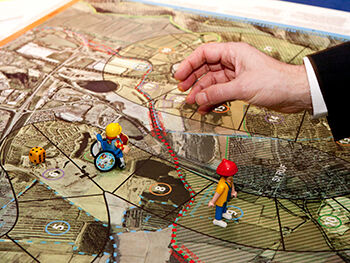University News Last updated 26 February 2016

A ground-breaking customisable board game which allows major decisions to be made at the roll of a dice will be officially unveiled next Friday (March 4) as part of a £110,000 project headed up by top researchers around the world.
The year-long initiative saw academics from Birmingham City University work alongside others from across the globe to devise a resource kit that uses a board game format to help address complicated land use and building issues.
The game builds on the successful 'Rufopoly' board game which saw participants playing around to reach decisions about challenges and opportunities taken in the Rural Urban Fringe – the space where cities meet countryside.
The tool-kit takes essential elements from Rufopoloy – which has been used by major organisations to thrash out green belt issues – but allows people to design their own games or use resource banks, game boards and questions to tackle their own challenges.
The games are being badged as ‘Participology’ - a free web based portal which will be presented at a workshop in Aston Conference Centre on Friday March 4 (10am – 3.30pm) alongside achievements and results found by participants across the globe.
Alister Scott, Professor of Environment and Spatial Planning at Birmingham City University was the Principal Investigator on the project.
"We have UK, Belgian and Australian presenters as well as government and school projects that highlight the real opportunities that a game-board format has to reach the parts more conventional tools can't."
Games involve rolling the dice to answer real-life questions based on top research to spark debate and examine situations.
Queen Mary Grammar School in Walsall have already used the format to help their pupils understand the different views surrounding the best kind of developments for areas of rural urban fringe.
Rob Matley, Head of Geography at Queen Mary Grammar School, said: “Our students have engaged with Participology with massive enthusiasm and have produced their own game board to help them understand contested issues in the urban fringe.
"This is a great way to flip the curriculum by encouraging the students to use the knowledge they have to design their own board and questions."
The game has also been adapted in Adelaide Australia, Malmo Sweden, Nebraska USA and Flanders Belgium to help improve engagement and understanding of complex issues in a fun way.